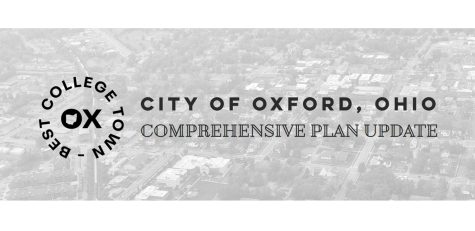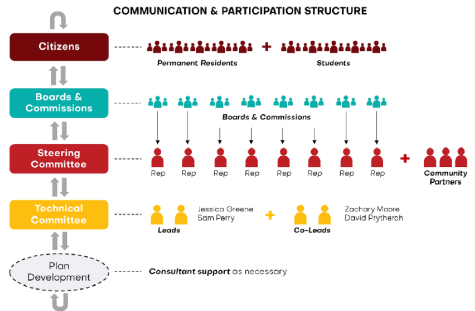Oxford to update comprehensive plan for city
Video provided by the City of Oxford
February 11, 2022
The time has come to update Oxford’s comprehensive plan, called Oxford Tomorrow, which will be a roadmap for the next 20 to 30 years of policy. The first public input session will be held online Wednesday, Feb. 16.
According to Oxford Tomorrow’s website, the comprehensive plan was last updated in 2008, and the first comprehensive plan adopted by the city was created in 1998.

The Columbus-based planning, urban design and landscape architecture firm MKSK will lead the process, with the help of City of Oxford staff and a steering committee made up of 31 community members. Of the three people from MKSK working on the plan, two are Miami University alumni.
“I do think their alumni status is helpful,” Assistant City Manager Jessica Greene said. “Knowing about this community and knowing some of our unique opportunities and unique challenges has been so valuable.”
The steering committee is mostly made up of representatives from various departments and boards of Oxford. Six members, three youth representatives and three citizens at large, are there to represent everyday Oxford citizens. These six members had to apply and were then chosen by City Council.

The Feb. 16 public input session will be at 6 p.m. over Zoom. Those interested in attending can register using this link. This will be the first of three sessions open to the public. It will begin with a presentation of the work that has been done on the plan to date, followed by public input through the use of polls and a Q&A session with the planning team.
“Oxford’s population now, and into the future, the vast majority are Miami students. They will remain the majority of what our community is, so this is their community just as much as it’s our community. Even if they only live here for four years, most people will have a connection with the community, maybe for their whole lives,” City Councilor David Prytherch said. Prytherch is also a member of the steering committee.
According to the Preliminary Planning Booklet that was shared with steering committee members at their first meeting, there have been more students living off campus than on campus since 1990. For this reason, the planning committee hopes it can get significant student input on the new plan.
Those who cannot make it to the public input meetings can still share their ideas using the Social Pinpoint Ideas Wall and the Social Pinpoint Interactive Map. Using these tools, community members can convey their thoughts and engage in discussions surrounding what they want to see for the future of Oxford.
Currently, nine elements have been identified that will be a part of the plan, but more may be added after public input. These elements are the following:
- Planning & Development
- Housing
- Transportation
- Utilities
- Economic Development
- Safety, Health & Equity
- Town & Gown Relations
- Parks & Recreation
- Climate
Seven of these were included in the 2008 Comprehensive Plan. Climate, as well as Safety, Health & Equity, were added at the urging of the City Council. The specific goals relating to these elements have not yet been decided.
“I’ve lived in Oxford for most of my life, so it’s obviously really important to me,” Michelle Miao said. Miao is a senior at Talawanda High School and is a youth representative on the steering committee. “It’s great that I get to shape how the future environment might be like here. It is such a forward-looking project, and I think that it’s really empowering for younger people to have a voice in this, not just established community leaders.”
In addition to the comprehensive plan, Oxford City Council works with the city administration to determine specific, yearly goals for the city. Prytherch said he envisions the comprehensive plan to be a guidebook for city officials and city administrators to use in the coming decades. It can be used when determining specific goals for each year.
In 2021, three key priorities were adopted, according to the minutes of the Jan. 18 City Council work session.
The first was affordable housing. The goal was to “Increase the diversity of housing options (especially affordable housing) by creating incentives and policy that allows new development to include housing for all income levels. Establish an affordable housing trust fund based on the needs from the housing study.”
City Council passed Lodging Tax legislation, which added short-term rentals to the types of properties that have to pay this tax. The money raised goes to a housing trust that can be used for various housing initiatives in the future. Additionally, $1.2 million of American Rescue Plan Act funds was directed to be invested into a trust and infrastructure to support affordable housing.
The second priority was a vibrant business district. The goal was to “Work to build vibrant business districts and avoid non-occupancy in commercial properties. Encourage all commercial properties inside the Uptown district to be performing, by passing legislation for incentives and disincentives for business performance.”
City administration conducted research on the city’s options to avoid vacant properties uptown. Assistant City Manager Jessica Greene said they found a municipality has no options over what private property owners do with their property, so the original goal was not attainable.
“We did a lot of research and really found that the original plan wasn’t possible, and that’s OK. Sometimes it’s what you find out,” Greene said.
Greene said the city is still looking to do further research on ways to incentivize vibrant business uptown to try to avoid vacant spaces. City administration went to the city council to propose other projects to focus on for this key priority.
The Oxford Area Trail System was greatly extended over the last year, and Amtrak made a planning visit to Oxford in May 2021. In partnership with Miami University, $4.8 million was raised to support the College at Elm business incubator. Ground will be broken on this project this year.
The third key priority was climate sustainability. The goal was to “Research and expand solar and renewable energy options in Oxford Community. (Consider Town-Gown Partnership for implementation).”
The city entered into a solar array contract, and the newly established climate steering committee finalized carbon neutrality goals that the city adopted and agreed to comply with by 2045.
“I think we made historic progress, at least on housing affordability and sustainability,” Prytherch said. “When I came on to council, there was no real attention to housing affordability. Sustainability and climate was not even on the agenda.”
There was a retreat planned to determine the goals for 2022 set for the end of January, but it was postponed until March 11 due to the pandemic.
“We decided to reschedule, but ultimately it makes sense. I want us as council to hear what comes out of the public input session for the comprehensive plan in February,” Prytherch said. “I feel that I’m a representative, but it’s hard for me to always know what the community wants. So, the comprehensive plan is the way, ideally, we want to hear from the community first, and then we set our priorities in relation to that.”
Currently, no meeting dates or times have been announced for the comprehensive plan steering committee or public comment sessions past Feb. 16. Greene said that by the next public session, a draft of the plan will be created for feedback. The plan is expected to be finalized by the end of this year.













